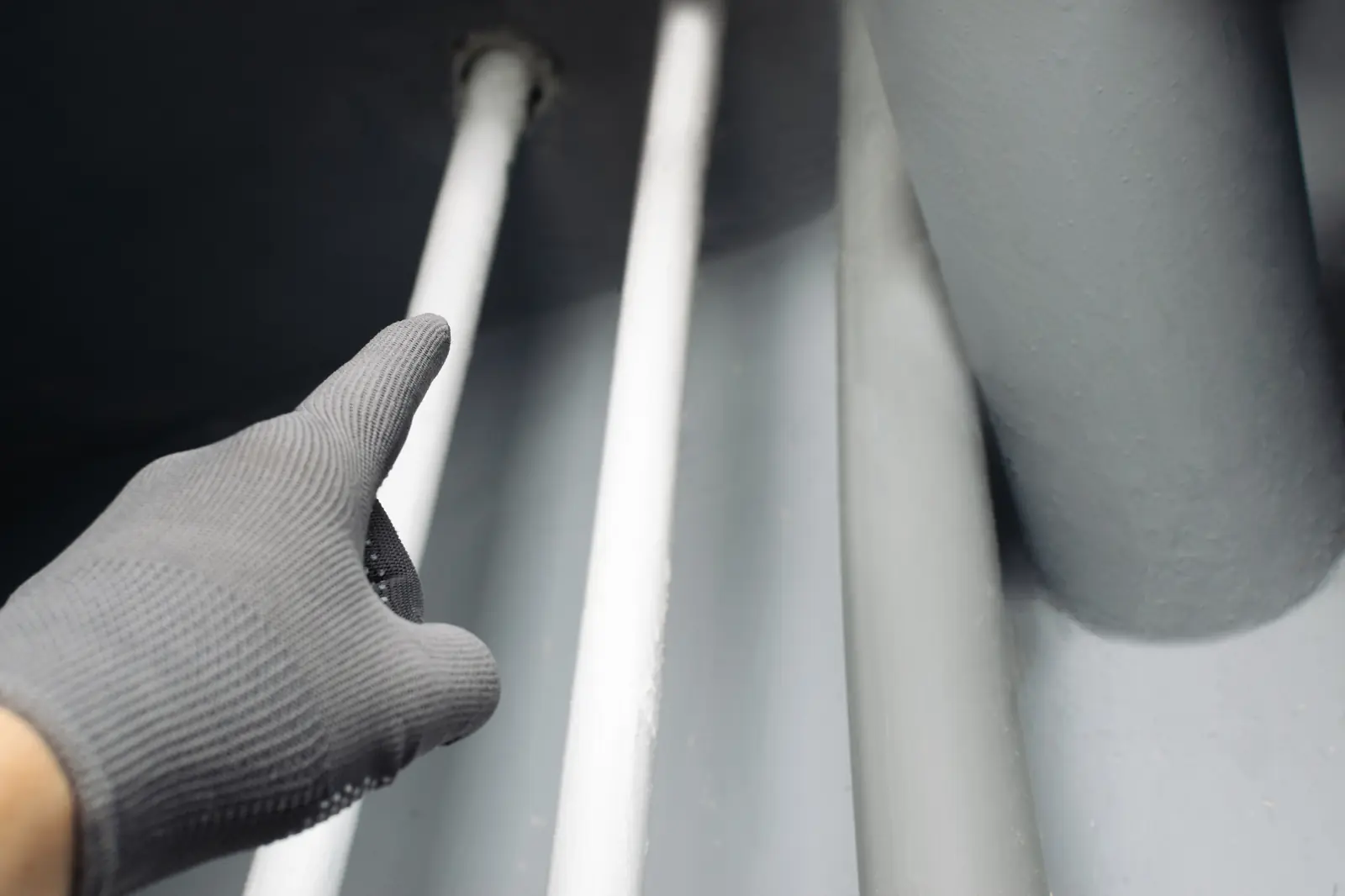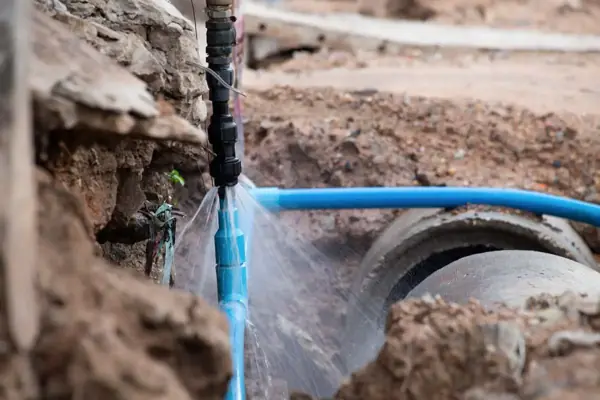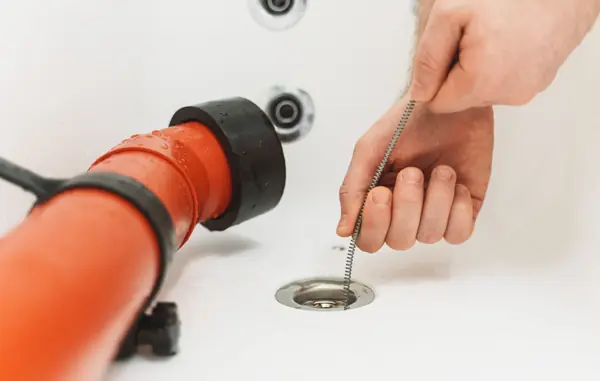Water leak detection protects homes from costly repairs. Using innovative technology and knowledge, our staff can find leaks quickly and accurately in hard-to-reach regions. Our cutting-edge equipment can locate hidden pipe leaks in walls or underground with minimal property impact. Water leak detection services give clients peace of mind that leaks will be fixed quickly, preventing water damage and mold growth and saving time and money.
Hi-Desert Plumbing provides reliable and effective water leak detection services to ensure customer safety and pleasure. Our knowledge and commitment to quality allow us to quickly find and fix any leaks in your property. Call Hi-Desert Plumbing today to learn how our services can prevent water damage.
Equipment
At Hi-Desert Plumbing, we offer a range of high-quality condensing water heater equipment to meet the diverse needs of our clients in the Hi-Desert region. Our selection includes:
- Condensing Tankless Water Heaters: Compact and energy-efficient, tankless condensing water heaters provide on-demand hot water without needing a storage tank.
- Condensing Storage Water Heaters: These units feature a storage tank to store hot water, providing a constant supply for larger households or commercial applications.
- Commercial Condensing Water Heaters: Designed for high-demand commercial settings, these systems are built for durability, efficiency, and reliability.
- Residential Condensing Water Heaters: Tailored for home use, residential condensing water heaters offer energy savings and consistent hot water for everyday needs.
- Various Sizes and Capacities: Our inventory includes condensing water heaters in various sizes and capacities to accommodate properties of all sizes, from small apartments to large commercial buildings.
- Leading Brands: We partner with reputable brands known for their quality and reliability, ensuring you receive a durable and efficient condensing water heater for your property.
Contact us today to learn more about our condensing water heater equipment and choose the best one for you. Our Hi-Desert hot water experts can help you locate the right solution.
Pricing
For accurate pricing information on condensing water heaters tailored to your specific needs and Hi-Desert property, contact Hi-Desert Plumbing directly. Our team will provide transparent pricing details, considering factors such as system size, installation complexity, and any additional features or requirements you may have.
Contact us today to receive a personalized quote and explore financing options if needed. We’re committed to providing competitive pricing and ensuring you receive the best value for your investment in a condensing water heater.
Types of Leaks
Types of leaks in plumbing systems can vary in severity and cause. Here are some common types:
Puncture occurs when a sharp object punctures the pipe, causing a hole. Depending on the size of the puncture, puncture leaks can be sudden and significant.
Gash: Similar to a puncture, a gash is a larger, more severe type of hole in the pipe, typically caused by a more forceful impact or cutting action.
Corrosion: Over time, pipes can corrode due to chemical reactions with water or other substances. Corrosion weakens the pipe material, developing small holes or leaks along the pipe’s surface.
Pinhole: Pinhole leaks are tiny holes that develop in pipes, often due to localized corrosion or manufacturing defects. While small, pinhole leaks can still damage water if left unaddressed.
Crack: Cracks in pipes can occur due to various factors, including age, freezing, or physical damage. Cracks may start small but worsen over time, leading to larger leaks if not repaired promptly.
Non-Seal: Non-seal leaks occur at joints or connections where the seal between two pipes or components fails, allowing water to escape. These leaks can often be detected by visible signs of moisture or dripping around the connection points.
Common Household leaks
Common household leaks can occur in various areas of your plumbing system. Here are some of the most typical types:
Toilet Leaks: These leaks often occur at the toilet’s base or around the flush valve. They can lead to water pooling around the toilet base or continuous running of the toilet, resulting in wasted water.
Faucet Leaks: Leaking faucets are often caused by worn-out washers or seals within the faucet assembly. They can result in dripping or running water from the faucet even when turned off, leading to water waste and potential water damage.
Supply Line Leaks: Supply lines connect fixtures like toilets, sinks, and appliances to the main water supply. Leaks in these lines can occur due to deterioration, loose connections, or physical damage, leading to water seepage or spraying.
Tub Leaks: Tub leaks can occur around the drain or faucet connections, pooling water around or underneath the tub. If not addressed promptly, these leaks can lead to water damage to surrounding flooring and walls.
Appliance Seal Leaks: Appliances such as dishwashers, washing machines, and refrigerators with ice makers have seals and connections that can develop leaks over time. These leaks can result in water damage to floors and nearby structures.
Pipe Leaks: Pipe leaks can occur anywhere along the plumbing system, including in exposed pipes, behind walls, or underground. They can be caused by corrosion, physical damage, or high water pressure and may result in water damage if not detected and repaired promptly.
Water Heater Leaks: Water heaters can develop leaks due to corrosion, high pressure, or a faulty temperature and pressure relief valve. A water heater leak can cause significant water damage and should be addressed immediately.
Sink Leaks: Sink leaks can occur at various points, including around the drain, faucet connections, or supply lines. These leaks can pool water underneath the sink cabinet or drip onto the countertop.
Signs
Signs of household leaks can vary depending on the location and severity of the leak. Here are some common signs to watch for:
- Visible Water: Look for signs of water pooling, dripping, or staining around plumbing fixtures, appliances, or walls. Visible water is often a clear indicator of a leak.
- Musty Odors: Persistent or moldy odors, particularly in areas with poor ventilation or moisture buildup, can indicate hidden leaks behind walls, floors, or ceilings.
- Water Meter Changes: Check your water meter periodically when no water is used. If the meter reading changes, it could indicate a hidden leak in the plumbing system.
- Increased Water Bills: Unexplained increases in your water bill, despite no change in water usage habits, may indicate a hidden leak causing water to be wasted.
- Low Water Pressure: A sudden decrease in water pressure in faucets or fixtures can indicate a leak or blockage in the plumbing system.
- Sounds of Running Water: If you hear running water when no fixtures are used, it could indicate a leak in the plumbing system.
- Soft or Soggy Areas: Soft or soggy spots in flooring, walls, or ceilings can indicate water damage caused by a hidden leak nearby.
- Visible Mold or Mildew: Mold and mildew thrive in damp environments, so their presence on walls, ceilings, or around plumbing fixtures may indicate a leak.
- Cracks in Walls or Ceilings: Water leaks can weaken the integrity of building materials, causing structural damage such as cracks or bulges in walls or ceilings.
- Warped or Discolored Flooring: Water leaks under flooring materials can cause warping, buckling, or discoloration, indicating water damage underneath.
If you see any of these indications in your home, find the leak and fix it immediately. Not fixing leaks can cause substantial water damage and high costs. Consider hiring a plumber to investigate and fix any potential plumbing leaks.
Process
Homeowners visually inspect bathrooms, kitchens, and utility rooms for leaks. They check for water stains, musty odors, and visible water. Leaks are then tested on plumbing fittings, appliances, and supply lines. Water heaters, faucets, sinks, dishwashers, and toilets are checked for dripping or pooling water and leaks around connections and seals. A moisture meter or thermal camera can discover leaks under floors or behind walls.
Leaks must be repaired immediately to prevent water damage. Tightening fittings, changing seals or washers, repairing pipes, or resealing joints may remedy the leak. Residents may fix problems and avoid leaks with regular plumbing maintenance and leak checks. Plumbers can detect, repair, and maintain complicated leaks to keep plumbing systems working smoothly and prevent water damage.
Resolve Leaks Fast – Call Us Now!
Repair leaks quickly. Contact Hi-Desert Plumbing for detection. Our skilled leak detection services quickly locate leaks behind walls or under floors. Our experts use moisture meters and thermal imaging cameras to find leaks. Once found, we repair it immediately to prevent future water damage.
Do not let leaks worsen—contact Hi-Desert Plumbing today for fast and reliable leak detection. We’ll protect your home or business from water leaks with our experience and dedication.




